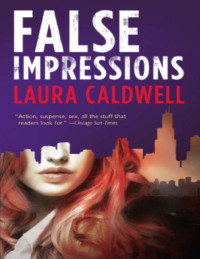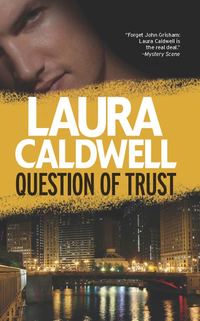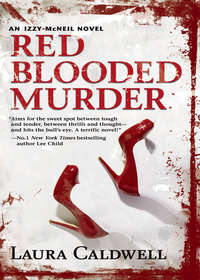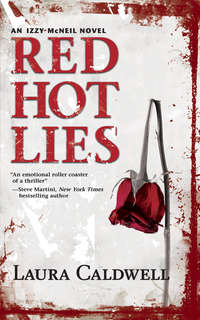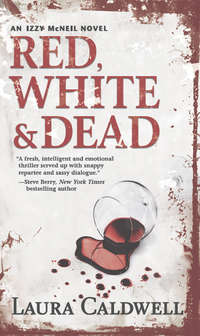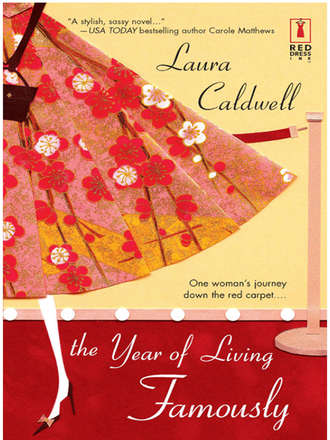
Полная версия
The Year Of Living Famously
“Oh,” Declan said. He looked at me, then back at her. I nodded in encouragement. Emmie always just jumped right into conversations like this—she abhorred pleasantries—and I was used to her running the conversation from the get-go.
“All right,” Declan said. “Well, I’m Declan McKenna, and—”
“Declan McKenna? Oh!” Emmie interrupted. She looked at me and smiled. I had told her only a little about our Internet and phone flirtations, but Emmie could read me well enough to know I’d been delighted.
I shot Declan an embarrassed smile. “We’re just stopping by to say hello, Emmie.”
“Of course.” She handed Declan a cup. “Are you a writer?”
“No,” Declan said.
“Pity. You have the perfect name.”
“I’m an actor.”
“Ah.” Emmie sounded disappointed, and Declan, as all men do, rushed in to appease her, telling her how he’d moved to the States from Ireland and how he was in town shooting a film.
“Mmm,” Emmie said, sounding more impressed now. “And remind me how you two know each other.” Emmie would cut off an arm before she would read the National Enquirer, and I hadn’t told her about my photo.
“We met in Vegas,” I said.
“When you were with darling Bobby?” she said.
I nodded.
“Interesting.” She patted the chair next to her. “Declan, move over here, won’t you?”
I groaned a little, but God love him, he crossed the room without hesitation and sat next to her. I remember thinking they looked lovely together: Emmie with her cap of ginger hair and her lined, pale face; Declan with his amused grin, his white teeth, his golden-brown eyes.
“Do you mind if I smoke?” Emmie said.
“Christ, no. I’ll have one with you.” Out of his pocket, Declan pulled a red book of matches.
I left them alone for a moment. When I returned, Emmie was in her prime entertainer mode, telling the story of a dinner she’d had with Prince Charles when he was a teenager. Declan’s quirky, rolling laugh filled the room. He cracked a joke about the royal family “splitting heirs.”
Emmie laughed and clapped her hands. Then she gave me a little bow of her head. Declan had been accepted.
When cocktail hour arrived (5:30 p.m., sharp, for Emmie), she whisked the tea tray away and brought out a bottle of champagne in a silver bucket.
“To Declan,” she said, raising her glass, “and the success of his film.”
Declan beamed. We all touched glasses.
Two hours and another bottle of champagne later, Declan and I left Emmie’s apartment. It was dark already, in that strange, sudden way that darkness falls when you’ve been drinking in the late afternoon.
“She’s fantastic,” Declan said. His hand was in mine again, and we were walking up Madison. We were moving in the direction of my apartment, although we hadn’t planned anything yet.
“I’m glad you like her,” I said.
“Now don’t get me wrong, here. She doesn’t hold a candle to you.”
I sneaked a sideways glance at him. “Is that right?”
There was a second’s pause, during which we kept walking, both of us looking straight ahead. “I don’t mean to give you a fright saying that,” Declan said. “I’m not usually like this, you see?”
Have I already said that I was smiling so much that afternoon? It seemed I couldn’t drag that grin off my lips, and right then it became wider. “Sure, I see,” I said.
Another pause. Declan held my hand tighter. “Where are we going?”
We’d reached my apartment by then. Without a word, I tugged him toward the door.
“Yeah?” he said, looking up at my brick building.
“Yeah,” I said.
Afterward, when we were lying in bed, he stared at my face. How strange to be studied like that, when there hadn’t been a man in my bed for so long, but how amazing to be there next to him. It was simply right.
“What kind of name is Felis?” he said, surprising me. I thought he was working up to something sexier.
“It’s Puerto Rican. My father was from there. My mother was Irish.” I said this proudly, though I’d never been to Ireland or even Puerto Rico, and I knew so little about my heritage.
“Thank God you’re half-Irish! Now I can marry you,” he said in a jokey tone.
His words sent a zing up my spine—terror and thrill in equal parts.
The next morning, Declan slept later than me, and when he came into the kitchen, he found me standing naked at the counter, eating my normal breakfast—pickles and peanuts.
“Nude breakfast?” he said.
I nodded. He growled in return.
“Christ, what’s this?” he said, walking to the counter. He glanced down at the two jars side by side. I had a small serving of peanuts poured into a cap. The pickles I pulled out one by one.
“Breakfast, just like you said.”
“What happened to oatmeal and runny eggs and slabs of bacon?”
“You must be thinking of breakfast in Dublin. But what you’re seeing here is the perfect start to a morning.” I picked up the jar of pickles and waved my hand under it like a game-show hostess. “Vegetables,” I proclaimed. Then I lifted the peanuts, and with the same underwave, said, “Protein.”
“You can get vegetables and protein by having tomatoes and eggs.”
“Ah,” I said, popping a peanut in my mouth, “but those foods only keep for a week or two. Meanwhile, my breakfast foods last for months.”
“You mean you eat this every day?”
“Pretty much.” I offered him a pickle.
It snapped as he took a bite. “You’re fecking weird,” he said between chews. “And I like it.”
chapter 5
To: Kyra Felis
From: Margaux Hutters
Hey, girl, what’s up with no return phone calls? Don’t you love me anymore? Wait, don’t tell me—you’re still running around with that actor. I thought he was leaving after a month or two. Hmm. Well, do tell, because I’m so bored. Peter is away again on a trial in Delaware, and he doesn’t even know when it will end. Work is painfully dull. Meanwhile, Manuel, my massage therapist, still wants to help me “relieve more tension,” if you know what I mean. And I’m starting to consider taking him up on that offer.
To: Margaux Hutters
From: Kyra Felis
Don’t you dare sleep with your massage therapist! You are married, for Pete’s sake (pun definitely intended). And, yes, Declan is still in town. I’m sorry I haven’t been calling you back. He’s consumed me. You liked him when you met him, right?
To: Kyra Felis
From: Margaux Hutters
Of course I liked him! What’s not to like about that sexy accent and that cute butt of his? It must be so glamorous, hanging out on a movie set. Maybe you’ll be discovered. Speaking of which, did you hear from the catalog that was considering buying your trumpet skirts?
To: Margaux Hutters
From: Kyra Felis
Rejected by the catalog. Again. But I won’t let it get me down. I’m too happy in other areas right now. I have to tell you, though, the movie set is anything but glamorous. Declan got me credentials to hang out for a few days, but it was like waiting at an airport. Declan shares a trailer with a bunch of other actors, and they sit in there all day playing Scrabble. Every once in a great, great while, someone knocks and tells them they’re on. They do one short scene about fifty million times, then go back to the trailer. It was as painful as listening to someone tell you about their dream. You just keep wondering when it might end. But Declan is happy, so that’s all that matters.
To: Kyra Felis
From: Margaux Hutters
Declan is happy, you’re happy. My God, would you listen to yourself? What happens when the movie is over?
To: Margaux Hutters
From: Kyra Felis
I know, I know. Other people’s glee can be so tedious, right? As for the movie, they’re done shooting this week, but Declan’s agent got him a bunch of auditions. In fact, he already landed one commercial, which shoots next week. So…drum-roll, please…he’s staying until September!
It was the everlasting summer. I’ve never felt that a summer was long, that it stretched on and on, that it was nearly all beautiful—sun and blue and street-side cafés—but that’s what it was like for those first few months with Dec, as I’d begun calling him, and me.
It was a perfect time to wear my most feminine clothes. I broke out all my fifties-style dresses with the flounced skirts, and I wore them with polka-dot sandals. I’ve never been the girl who could get away with wearing cargo pants and a ripped T-shirt. At my size, I look too much like a boy with boobs. And so I carried my pink alligator clutch bag, and I wore my yellow twin set, my hair in a high, bouncy ponytail. Oftentimes it’s hard to find occasions to dress so girlie, but falling in love gives you a built-in excuse.
Declan didn’t look like a typical movie star, if there is such a thing. Tall and broad, yes. Wavy, longish, coppery-brown hair that women wanted to rake their fingers through, yes. Honey-brown eyes, sharp and knowing, yes. But his complexion was somewhat ruddy, and his waist became a little soft when he drank too much beer.
His coloring was all off, at least for me. I’d always preferred men who were dark. Bobby was just my type, in fact, with his inky-black curls, his olive skin and almost black eyes. I’d had a mad crush on Bobby after we met, when we were both in graduate school. The crush dissipated, mostly, and we became tight buddies. Years later, we had sex one night, something we needed to get out of our system. It had been lingering there, after all. But it was odd. He was too familiar and yet the intimate parts of him so male, so foreign. Luckily we were both stoned, and the whole experience is rather hazy.
Anyway, even though Declan wasn’t necessarily my type, I adored the way he looked, even from the start. He was taller than me by at least ten inches, yet he was always ducking down when we hugged, trying to place his head on my collarbone, as if sensing a warmth there and burrowing for that heat. But since he wasn’t the Latin-lover type, the blond-surfer type or the tousled bad boy, I never really thought he’d be all that famous. That sounds terrible. It sounds as if I didn’t have faith in him. That wasn’t it. I just couldn’t imagine someone like him, with the lilting brogue and the goofy laugh, being an international superstar. I don’t think he could have imagined it, either.
That summer we talked about how much he simply wanted to make a living as an actor. I knew what he meant. I just wanted to make a living as a designer. I didn’t want to be a famous designer; I wasn’t bold enough to think it, I didn’t need that. But when people asked, “What do you do for a living?” I wanted to be able to say, “I’m a designer” and I wanted that to be all. I didn’t want to go into a lengthy explanation about how I was trained to be a fashion designer, how I was trying, but how I had a small trust fund and was doing freelance design jobs and temp work in the meantime.
I had started working at temp agencies in my early twenties, in order to fill out the periods when I couldn’t sell a line of clothing or couldn’t get a freelance design gig. At the time, many of the others who were sent on the same jobs were my age, at my stage in life—people I could run around with. We would go out for drinks at the end of the day and make fun of the stiffs in the office where we’d just worked, self-satisfied because we didn’t have to make our livings there. But by the time I met Dec, I was often the elder. I was the one who was pitied. I saw it in the faces of the twenty-one-year-olds who had just migrated to the city, smug in the fact that they would move on shortly, that the temp jobs were just stopping grounds for their eventual greatness. I knew them. I knew their misplaced arrogance, and I didn’t blame them for their pity. I didn’t even fight it, because I’d begun to look at myself the same way.
Declan understood all this. He’d folded jeans all day while working at the Gap; he’d suffered the humiliation of waiting on Al Pacino at a coffee shop and accidentally spilling steamed milk on him. He felt he might be on the verge of making a steady living, since he’d landed three roles over the last fourteen months, including the movie in Manhattan, but his family was still suggesting that maybe he should come home to Dublin and work with his dad as a courthouse clerk.
Luckily, I didn’t have family pressure. Emmie would no sooner pressure me than she would move to Nebraska. To Emmie, each person is her own master. The only people she bossed around were her authors, and even then she trusted their judgment about the course of their careers and life. How lovely it was to have someone like Emmie who thought that you, and only you, could decide your fate. Occasionally, though, I thought about how nice it would be to have someone question me, give me a little push.
One night, Declan came to my apartment with a clumsily wrapped present, roughly the size of a softball.
“Open it,” he said, handing it to me. “Fast.”
The wrapping paper was green foil, obnoxious and yet seemingly perfect from him. “It’s cold,” I said, feeling it.
“Hurry, gorgeous,” he said.
I tore off the paper. I could tell he’d wrapped it himself because of the long, tangled strips of tape that wound around the thing.
I saw what was inside and I giggled. “A pint of ice cream?”
“Not just any ice cream,” he said, sounding indignant. “This is Ben & Jerry’s! There’s more crap in here than you can imagine. It’s so American. Not a bit like our blocks of HB back home.” He withdrew two silver spoons from his pocket and handed one to me.
We stood at my kitchen counter eating runny spoonfuls of Chubby Hubby, and I smiled at him, thinking, Who gives ice cream for a present?
My boyfriend, I answered inside my head. My boyfriend, my boyfriend, my boyfriend.
As it turns out, it was Declan, my boyfriend, who gave me the little push. Not explicitly. Not with words, but with the possibility of a new life.
chapter 6
I knew that I was in love with him for certain when Emmie got hit by that car.
She was on Astor Place by her office, coming out of the little wine bar that used to be a speakeasy. She liked to tell people that she could remember drinking there during Prohibition, which was a complete fabrication. Emmie was barely out of the womb when Prohibition began, but she was one of those people who took pride in her age, rather than hiding it. She expected complete respect for living as long as she had.
Right before the SUV struck her, she was on the arm of Gerald Tillingham, another literary agent who was a few years older than she, but who had retired over a decade ago. She and Gerald had been an item back in the sixties after his first wife died, but now they were just buddies, old cronies who saw each other once a month to drink Pimm’s and gossip about their friends. Sadly, the fact was that many of their friends had passed away.
Gerald had too much to drink, Emmie would tell me later when she was conscious and able to speak in coherent sentences. He had offered his arm to her like a gentleman, but it was he who needed support. They were crossing the street when Gerald faltered, one of his knees giving way. As Emmie struggled to catch him, the SUV turned the corner too fast. Startled by the car, Emmie lost her grip on Gerald and he fell again, and it was she who got hit. The SUV stopped immediately, but her leg was already broken, her lung punctured.
By the time I arrived at the hospital, Emmie was out of surgery, her leg pinned, her lung repaired. They said the lung would always trouble her and that I should get her to quit smoking. I said I would try, though I knew she would never do it. Despite the irony, Emmie would sooner die than give up cigarettes.
I pushed open the door quietly because the nurses said she was sleeping, and also because I was afraid of what I might see. And there she was, propped high on the bed to allow her lungs to drain, her leg huge and lumpen with plaster, metal prods piercing it. She was indeed asleep, the makeup on her papery cheeks faded, her dyed reddish hair fuzzy and misshapen by the pillow. Emmie would have hated how she looked. She took pride in her expensive cosmetics and the clothes she selected with care. The sapphire ring wasn’t on her right hand, and that absence was the most shocking of all. I’d never seen her without it.
I sat on the edge of her bed, half hoping the movement would wake her. It didn’t, and I couldn’t bear to sit there very long without helping her somehow, without doing something. To watch her sleep like that was an invasion of privacy, like spying on someone on the toilet.
I left the room and went in the stairwell to call Declan. I had a cell phone by then, which he’d bought me. I had been one of the lone holdouts in all of Manhattan, one of the few people who weren’t connected by the head to their cellular. But Declan said it made him “absolutely mad” when he couldn’t find me. So I let him buy it. Later in L.A., I became a master at the thing. I grew attached to it like other people to their pets. But in New York, it was still a novelty, and I felt a rush of gratitude that I had it, that I had Declan to call.
He came to see us in the hospital that night. I told him it wasn’t necessary, but he wanted to come. Emmie was groggy but awake by then, and he chatted with her as if she hadn’t nearly died; he brought her magazines and told her his awful jokes. But it wasn’t only that which made me say “I love you” in front of the hospital later that night. It was what happened when I left for ten minutes to go for coffee. I came back and found him feeding Emmie ice chips with a white plastic spoon. He was bent at the waist, his hair falling over his eyes, his arm outstretched. Emmie’s lips were pink and cracked; they were pursed and straining for that white spoon. His sweetness, his ability to do that, along with Emmie’s almost childlike response, undid me.
September came too fast, but Declan was back in L.A. for only three days before I was on a plane to spend a week with him. Those few days apart had been agonizing. The things that used to make me content—getting a coffee on the corner, seeing a movie at Bryant Park—seemed empty and flat without him there.
I arrived in L.A. for our visit on a Tuesday afternoon. Outside, I was buffeted with warmth and sunshine. I’d never been to Los Angeles, and I couldn’t have been more thrilled.
Declan pulled up in a rusty white hatchback. He leaped out of the car and ran around to the sidewalk. He picked me up and twirled me around, and I imagined we looked like the ending of an old movie.
“Kyr.” He nuzzled his face in my collarbone. “I’ve missed you.”
The car smelled strongly of mildew, and there were wrappers from bags of potato chips (crisps, Declan would call them) on the back seat. But it didn’t bother me. I was in love and it was sunny, and nothing else mattered. Until we got to the apartment.
Why is it that men will spend money on expensive dinners, work out for hours a day, and even wax the hair on their backs in order to attract and keep women, but they won’t do a thing to their home?
Declan’s apartment was in Venice Beach. It had a balcony with a plastic table and two mismatched chairs, and if you looked to the left, you could see the silvery blue of the ocean. But inside was chaos. Not a quirky, lovable chaos, the likes of Emmie’s place. No, this was a teenage-boy type of chaos that would have made any self-respecting woman flinch.
I knew about Declan’s first love, a girl from Dublin named Finnuala, and I knew he’d dated an ad exec in L.A. a few years ago. But maybe this was why he’d been single for a while. In New York, I’d assumed the mess was due to two men living in a small space. Apparently it was just Declan.
The carpet, a worn, dingy gray, was littered with gym shorts and T-shirts and old copies of Variety. The walls were contractor white and marked with greasy fingerprints. In the kitchen, crusted-over dishes and forks commandeered the sink. The bedroom had cardboard boxes instead of a dresser, and, worst of all, a futon.
My first sexual experience, an exchange of oral pleasantries, was held on a futon my freshman year at Vassar with a boy whose name was Thadeus Howler. Thadeus was from the South, had a slow rolling drawl and went by the nickname of Dixie. Dixie Howler, you might not be surprised to hear, came out of the closet a few years after our night together and is now one of New Orleans’s most celebrated cross-dressers.
Both Dixie and I, I believe, were on that futon that night because we were both late bloomers in the sexual arena. We both needed to get some experience, and you didn’t want to practice lingual technique on someone you actually liked. So there we were, fumbling and slobbering in the dark on his lumpy, cheap-cologne-smelling futon. I have never since been able to look at a futon without cringing.
And I did cringe in Declan’s bedroom that day. He could barely get me to take a step inside the doorway.
Next on the house “tour” was the bathroom.
“Sorry, love,” he said, flicking on the lights. The counter appeared encrusted in old, calcified dollops of toothpaste and shaving cream. The tub boasted a gray ring and little patches of black clinging to the grout.
“I was going to spend yesterday cleaning,” Declan said, “but I got a callback for this Denny’s commercial, and I had to see my acting coach, and… What? Is it that bad?”
“No,” I said. “It’s so much worse than that bad.”
I turned the lights off—too painful—and went back in the bedroom to stare at the futon.
“I’ve been meaning to hire a cleaning crew. You know, one of those all-day jobs,” Declan said.
“Okay.”
“And I’ll do…What else will I do?” He seemed to be talking to himself, walking through his apartment, like he was seeing it for the first time. “Christ, it’s horrible, I know. But I don’t know where to start.”
He came in the bedroom and put a hand on my shoulder. His eyes said, Help me.
“That’s got to go,” I said, pointing at the futon, buried under jeans and wet, crumpled towels.
“Right. Right. Good.” Declan nodded, his eyes excited, a man with a mission. “I’ll call the cleaning people, and there’s a bed store up the street. You’ll pick one out, okay? And we’ll stay at a hotel for a day or two.”
“You’d do that?” I knew his agent had received a check from the movie this summer but hadn’t paid Declan his part yet. I knew he didn’t have money for cleaning crews and new beds and hotels. But Declan was always going out of his way to make me happy.
“Of course, Kyra,” he said. “It’s worth the interest on my Visa, and this is your home, too.”
I didn’t know what he meant—I was only visiting for six days, after all—but I liked the sound of his words, the sound of his brogue when he said my name. So I put my arm around his waist, and we headed downstairs to the mildewy hatchback.
A few days later, after the place had been scrubbed and organized by women from a company aptly named Angel Maids, Declan and I lay in his new bed. Our new bed, he kept saying. It was almost eleven in the morning, and we were meeting Bobby for lunch in an hour, but we were languid in each other’s presence. The ocean air puffed in the window (finally opened for the first time after one of the Angel Maids chipped off the dried paint that had sealed it). The air was like a balm, making us even more lazy.
Declan rolled over and ran his hand over my bare belly. “Let’s go to the beach today after lunch, shall we?”
“Yes, please!” I said. It was a joke between us. We’d overheard a mother the day before telling her little boy that if he was going to say the word yes, he should instead say, “Yes, please,” but if he was going to say no, he should say, “No, thank you.”
Declan chuckled and snuggled his face into the crook of my shoulder.
“I’m having such a good week because of you,” I said.
Dec pulled his face back and studied me. “I’m having a good life because of you.”




